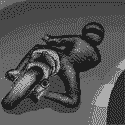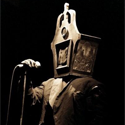|
breaklaw posted:My friends lives are hosed because they used heroin and got addicted. quote:The legality of the drug has nothing to do with its effects on the body. quote:That chemical drastically changes a person in many ways. quote:I'm saying that I'm afraid that if it were legal more people would try it and become addicted, quote:and the part of your quote I bolded I simply don't believe. quote:You must have never been around for the before and after of heroin usage to say something like that. quote:I'm sure there are functioning heroin addicts out there, but the substance is simply too dangerous to be made legal and freely available. This is the part where I'm a hypocrite because with weed I will say "people will do it anyway, legal or not" but with Heroin I hope very much that the onerous process of scoring smack and the legal risks involved keeps some people from ever trying it. quote:As far as treatment, I'm all for that, but the real treatment program is don't ever loving use heroin ever. Treatment is for trying to save people that have already fallen overboard from drowning. I'm saying I don't want the gaurd rail taken down and have that many more people falling overboard. Look, I realize this is a personal subject for you, but you're falling into the emotional trap of saying "this is bad, and therefore should be banned" when the fact of the matter is that banning isn't helpful and is actively harmful for a huge variety of reasons. The drug war - as a whole, not just on marijuana - is perhaps the worst civil rights abuse of the modern era, and I'm willing to stand by that statement.
|
|
|
|

|
| # ? May 12, 2024 01:47 |
|
Anyone who is apprehensive about decriminalizing and regulating heroin, meth, or crack, should look into Dr. John Marks, and the Widnes Clinic trials, where addicts were given prescriptions for their drug of choice and group therapy. I first read about it in Mike Gray's "Drug Crazy". Here's a link to the relevant chapter: http://booktrope.com/chapter/drug-crazy-chapter-9-lessons-from-the-old-country/ From the book: quote:But as he began digging through the records, Marks made a series of surprising discoveries. Among the cohort of serious needle-users now in his charge, he expected to find 15 to 20 percent infected with the AIDS virus—Liverpool is a port city after all—but there was not a single case in the whole roster. When he checked for drug-related deaths he found the same thing. Then he interviewed the patients and was dismayed to find them in good health, most with jobs, and all clean and properly dressed.[11] His next surprise came from the local police. Heroin maintenance, they said, cut crime. In one test, the Cheshire Drug Squad tracked a hundred users before and after they entered the clinic and found a 94 percent drop in theft, burglary, and property crimes.[12] But the most interesting finding was the decline in the number of new users. After the clinic opened, convictions for illegal possession in the area dropped immediately.
|
|
|
|
Chitin posted:
Even if all of this is true, the addictiveness is far higher for heroin than is is for alcohol. The only thing more addictive s nicotine. Look at the amount of people who can drink without becoming addicts and tell me that for heroin it is the same or lower, there's no loving way. Same thing for crack cocaine and meth. You can become fully addicted after just a couple of times using. That is too dangerous to risk legal purchase and usage. Radbot posted:Why do we assume that more people are going to use it if it's no longer illegal? I have an awfully hard time believing that heroin has highly elastic demand. This is the question that we can't answer. I think it's very possible that if it were legal more people would try it. Unlike with marijuana, a number of those people will become physically addicted. Knowing the effects of the drug, that is simply too risky a proposition to even try on a large scale basis.
|
|
|
|
breaklaw posted:This is the question that we can't answer. I think it's very possible that if it were legal more people would try it.
|
|
|
|
breaklaw posted:This is the question that we can't answer. I think it's very possible that if it were legal more people would try it. Unlike with marijuana, a number of those people will become physically addicted. Knowing the effects of the drug, that is simply too risky a proposition to even try on a large scale basis. Yes we can. Read this article about the incredibly positive effects Portugal has seen after decriminalizing every drug and providing greater access to treatment: http://www.businessinsider.com/portugal-drug-policy-decriminalization-works-2012-7
|
|
|
|
breaklaw posted:That is too dangerous to risk legal purchase and usage. Which is why the vast majority of people won't take the risk of purchasing and using it even if it is legal. There's plenty of controlled substances I would be tempted to use if they were decriminalized; heroin isn't one of them. At the point at which you're willing to take that incredibly-well-publicized risk, is the risk of it being illegal really going to be what holds you back? How many people are going to thread that needle as compared to the number of people who don't receive treatment because admitting heroin use to a doctor would destroy their lives?
|
|
|
|
breaklaw posted:Even if all of this is true, the addictiveness is far higher for heroin than is is for alcohol. The only thing more addictive s nicotine. Look at the amount of people who can drink without becoming addicts and tell me that for heroin it is the same or lower, there's no loving way. Same thing for crack cocaine and meth. You can become fully addicted after just a couple of times using. That is too dangerous to risk legal purchase and usage. Opiates, as much as people believe, is not a 'one and you're done' drug, neither is Alcohol or most other drugs for that matter. It takes the body time to get habituated to that sort of condition and that is what creates the physical dependence. Psychological dependence is a whole other thing and can only be measured on a person by person basis. Entirely subjective. To some the feelings of being on heroin would be great. Some others would much prefer the feelings brought on by Alcohol. It also depends on the person's mentality, current emotional states and a whole bunch of other qualitative variables. The bottom line is: Heroin, biologically speaking, is less addictive than Alcohol. It would be wrong to say either is more addictive psychologically.
|
|
|
|
I just found out that a colleague was accepted onto Hickenloopers commission! I'm hoping that I can help him out from the public health/epidemiology side and actually contribute to this effort. Colorado already has the least disparity in placement of dispensaries and I think that he'll propose keeping distribution to the current dispensaries with the same rules about one person = one license. The problem is going to come when the community sees the dispensaries as being unwanted due to traffic or local use or something, then the more wealthy communities will shut down the local ones increasing the overall disparity. Anyway, I HOPE I can transfer some good, current data here as the process continues!
|
|
|
AreWeDrunkYet posted:So Delta-Wye, what exactly was this "mess" last time we tried opiate legalization and how is it worse than the situation today? If you phrase it that way, it makes me think that you don't know what I'm referring to. Your previous post, although it didn't call me out by name ( This discussion reminds me of the tail chasing "We have lots of crime, lets hire more beat cops" -> crime goes down due to heavier enforcement -> "We don't have any crime, why do we have such a large police force? Let's lay some of them off" -> crime goes back up, returning us to where we started. Various forms of opiates used to be unregulated in the US in the past. They were heavily abused and there were tons of societal ills, rightly or wrongly, blamed on them. It was decided to make them illegal; while there are reasons to question some of the reasons they were initially prohibited, certainly everyone can agree the effort to criminalize them wasn't because they were considered beneficial for society. A strong argument for complete decriminalization requires a bit more than: LeftistMuslimObama posted:If you legalize all drugs (even the scary ones) and turn production over to Pharma, the following advantages occur: To be effective, a decriminalization plan has to simultaneously crowd out the existing black market and distribution channels, while reducing usage rates, related crimes, and harms and costs to both the individual and society. This is a pretty tall order, and LeftistMuslimObama's bullet points fail to convince me of any of these things. As a member of the choir, I am rolling my eyes at these suggestions, because they do not seem to realistically take into consideration the potential down sides of legalization or decriminalization. Some of it is down right dumb without additional information: quote:1 The FDA can impose strict standards of quality and dosage on drug production. quote:2 More research is possible, allowing actual medical professionals to determine safe doses. quote:3 The criminal producers of drugs no longer have a source of profit. Since there's not really any other business that can support an army of violent assholes (CIAs already booked up kids), the cartels fall apart and are easier to sweep up. quote:4 Revenue raised from sales of drugs is now in the hands of the government (rather than criminals) and can be used for the public good. quote:5 Drug abusers, no longer defined as criminals, feel less shame and fear and might be more willing to seek help with their addictions.  We have a simultaneous problem with health services being under utilized because of barriers to entry such as cost; sure some people will be helped, but not everyone with a drug issue. I would postulate a small portion in the US would be capable or willing to seek medical treatment, especially if drug treatment is seen as a cross between how drug users are currently seen and how mental health patients are currently seen. I agree that treating it a medical/civil issue and not a criminal one will help, but it's not as simple as a blanket legalization effort and calling it good as this bullet point seems to indicate We have a simultaneous problem with health services being under utilized because of barriers to entry such as cost; sure some people will be helped, but not everyone with a drug issue. I would postulate a small portion in the US would be capable or willing to seek medical treatment, especially if drug treatment is seen as a cross between how drug users are currently seen and how mental health patients are currently seen. I agree that treating it a medical/civil issue and not a criminal one will help, but it's not as simple as a blanket legalization effort and calling it good as this bullet point seems to indicatequote:6 Those who don't want help will at least have safe, clean environments in which to use. Think heroin bars where everyone can order a new, sterile syringe and a comfy chair. This would immediately cut back on the spread of HIV and other IV diseases. Such places would have good security to prevent the kind of violent freakouts that happen when people start doing drugs in alleyways and such. This is a big complicated issue and boiling it down to a couple talking points that are repeated over and over is disingenuous at best. I think Portugal has done an amazing thing by trying something different and I am disappointed that it seems to be missing from Serious Discussions on this topic (say, presidential debates or something, not on interweb forums). The strongest arguments are furnished with rebuttals, not parroting talking points and beating dead horses. Sorry about the Delta-Wye fucked around with this message at 01:20 on Jan 24, 2013 |
|
|
|
|
Delta-Wye posted:If you phrase it that way, it makes me think that you don't know what I'm referring to. Your previous post, although it didn't call me out by name ( Can you cite anything to support abuse rates above today's? And more importantly, can you cite anything that would support that the legalization regime at the time resulted in more harm than that inflicted by casting drug users as criminals across the board and the generally fun results of putting a multi billion dollar market in entirely unregulated hands? Because I suspect you would be hard pressed to show that any part of opiate legalization from the 1890s or thereabouts was in any way worse than the millions imprisoned and tens of thousands murdered as a result of existing policy. The biggest mistake you seem to be making is that policy decisions a century ago were made for entirely rational reasons. We haven't even gotten close today, you are giving our forebearers far too much credit. Are you even aware of the rhetoric surrounding the introduction of prohibition?
|
|
|
|
I've been exposed to opiate addiction since I was a little boy and some of the information here is bullshit. Regulation would cause problems, the stuff is insidious and has lots of long-term health effects that build up over time. Brain damage, chronic gut peristalsis, permanent changes to neurotransmitters and sex hormones are not negligible effects. It's also bullshit to pretend that it only happens to people with poor self-control, I've never been physically addicted but I promise that it could have happened to you so easily if you were born into the right life. If there were pills on the shelves at wal-mart that filled you with bliss and the internet told you were less dangerous than cigarettes, you think people wouldn't try it whereas they wouldn't try buying heroin in the ghetto? Prohibition is even worse but at least be honest.
|
|
|
|
Splurgerwitzl posted:I've been exposed to opiate addiction since I was a little boy and some of the information here is bullshit. Regulation would cause problems, the stuff is insidious and has lots of long-term health effects that build up over time. Brain damage, chronic gut peristalsis, permanent changes to neurotransmitters and sex hormones are not negligible effects. It's also bullshit to pretend that it only happens to people with poor self-control, I've never been physically addicted but I promise that it could have happened to you so easily if you were born into the right life. I think the idea is to fund rehab clinics where people could go to safely get clean instead of going cold turkey and possibly dying. the reason we don't do more of this is because we're too busy criminalizing the users. I don't think anyone wants to see heroin for sale over the counter at the local Walmart.
|
|
|
|
Splurgerwitzl posted:I've been exposed to opiate addiction since I was a little boy and some of the information here is bullshit. Regulation would cause problems, the stuff is insidious and has lots of long-term health effects that build up over time. Brain damage, chronic gut peristalsis, permanent changes to neurotransmitters and sex hormones are not negligible effects. It's also bullshit to pretend that it only happens to people with poor self-control, I've never been physically addicted but I promise that it could have happened to you so easily if you were born into the right life. All of the issues you just cited have to do with impurities in the supply or lasting effects of overdose, not opiates themselves. In general overdose occurs because users aren't certain of the strength of what they're getting. Legalization and regulation is not the same as "sold at Wal-Mart." There are many forms legalization could take but I don't think you'll find many people saying that heroin should be sold the same way alcohol is.
|
|
|
|
Chitin posted:All of the issues you just cited have to do with impurities in the supply or lasting effects of overdose, not opiates themselves. In general overdose occurs because users aren't certain of the strength of what they're getting. http://link.springer.com/article/10.1007%2Fs11065-007-9041-y http://www.ncbi.nlm.nih.gov/pmc/articles/PMC1974804/ quote:Daniell HW, Lentz R, Mazer NA. All I meant to express by the wal-mart scenario is that opioids are exceptional among drugs in their abuse and addiction potential. e: Oh and I forgot to mention that opiate addiction isn't fatal by itself. It makes you poo poo all over yourself and hurt everywhere and wish you were dead. It's usually the effects of the opiates themselves that kills, usually from respiratory depression or choking on your own vomit. Chitin is right by saying that adulterants can make things even worse, particularly when you're mainlining drugs past every defense your body has with a needle. Your veins don't want coca-cola or levisamole or pill binders in them. a dog from hell fucked around with this message at 03:38 on Jan 24, 2013 |
|
|
|
AreWeDrunkYet posted:Can you cite anything to support abuse rates above today's? Final paragraph of page 3: http://books.google.com.au/books?id=RM_oWWqv54IC&lpg=PP1&dq=disorder%20of%20choice&pg=PA3#v=onepage&q&f=false
|
|
|
|
Delta-Wye posted:Using the FDA and existing architecture makes sense, but can that distribution channel undercut current distribution methods? Keep in mind with legalization, risks for producing, distributing, selling, or holding would most likely be reduced or removed completely, changing the natural price point of the black market. If the current black market still exists, is still profitable, and undercuts the official channels, what will change? If you enforce laws against "unofficially produced or purchased" substances, are you just recreating prohibition and its ills again? Will the FDA use their 'impartial judgement' to un-legalize it by keeping it off the market? Who knows! It's much more complicated than the bullet point indicates. Do you have a real world example in mind in which some product is legal yet somehow more readily available and desirable to the public at large through the black market? There are black market cigarettes and moonshine in places, sure, but would anybody really say that the above ground, legal market hasn't sufficiently crowded them out? What makes you think it would be different with other drugs if they were legalized and regulated? In fact, what would differentiate the black market from the regular market if the product was legal? Not having a valid business license? I don't think your objections have much validity.
|
|
|
|
breaklaw posted:My friends lives are hosed because they used heroin and got addicted. I don't inject heroin into my groin for pretty much the same reasons I don't smoke tobacco. I don't want an expensive habit, I don't want to alienate my friends and I don't want to end up with a permanent disability. What can be surmised from this? It is isn't prohibition that deters me from using heroin. There are, however, some people who are attracted to the idea of injecting heroin. Your friends probably fall into this catergory. Health risks, potential addiction, social and financial ruin did not seem to deter these people from using it. Funnily enough, prohibition didn't deter these people from using heroin either. If prohibition doesn't deter people like me or people who should probably stear clear because they're likely to end up with a problem, who does it deter?
|
|
|
|
Splurgerwitzl posted:http://neuro.psychiatryonline.org/article.aspx?articleid=103089 You're right, I'm wrong - there are other side effects to long-term opiate use. I'm not an expert (though I am married to one). Regardless, none of these are as bad as the problems demonstrably caused by prohibition to either the user or society, nor are they worse than problems associated with long term alcohol or tobacco use. None of this is to say that heroin is a good thing to do. I'm not recommending it. But there is no indication that prohibition prevents people from using (as KingEup helpfully linked above, use in the 1800s began to decline around 20 years before prohibition) and it demonstrably kills them before they can stop. I understand that people ruin their lives due to heroin, but the only way they have a chance to recover is if they stay alive, and prohibition is primarily what kills heroin users. Heroin is a particularly egregious example, but the same applies to every other major illegal drug. There are the obvious ones like MDMA, LSD, and shrooms, where there are no (or very limited) physical dangers aside from impurities; there are cocaine and crack cocaine, which are addictive in the same way gambling is addictive (they are not physically dependence forming, which is not to say they can't ruin your life) and which are currently being cut with cow dewormer; there's methamphetamine, which is apparently the most dangerous drug ever despite being available by prescription for ADHD and is also not dependence forming; the list goes on. Prohibition has also created a market for lovely synthetics that come out faster than they can be made illegal - so there are already drugs that you can purchase at any given head shop, except that we don't know anything about dosage, long term effects, addiction potential, or anything else. Maybe they're safer, maybe they're not. Heroin, cocaine, meth - these are bad things for the most part. But the way to prevent people from using - and the way to help current users - isn't prohibition. Deregulation solves the criminalization issue but not most of the other harms associated with use or the drug market at large. Legalization and regulation with an eye towards education, prevention and treatment are the much more effective solution.
|
|
|
AreWeDrunkYet posted:Can you cite anything to support abuse rates above today's? I'm afraid that proper studies, as we understand them today, weren't exactly done in the 18th and 19th centuries. However, it's not like abuse and addiction didn't occur: https://www.thewatershed.com/blog/history-lesson-19th-century-opiate-addict/ You can hand wave all you want, but legalization and decriminalization both have draw backs. The argument you need to be making isn't that they are drawback-less, but they are better than prohibition. And honestly, I think it would be a marginal benefit, so saying it is across the board much better is a hard sell. 800peepee51doodoo posted:Do you have a real world example in mind in which some product is legal yet somehow more readily available and desirable to the public at large through the black market? There are black market cigarettes and moonshine in places, sure, but would anybody really say that the above ground, legal market hasn't sufficiently crowded them out? What makes you think it would be different with other drugs if they were legalized and regulated? In fact, what would differentiate the black market from the regular market if the product was legal? Not having a valid business license? I don't think your objections have much validity. "A Voter’s Guide to Legalizing Marijuana posted:If a state legalized production, it seems unlikely that Federal agents would allow flagrant violations of Federal law, such as openly operating industrial farms or commercial greenhouses. But production might still take place in “grow houses” (residences or warehouses dedicated to growing marijuana) that are outwardly indistinguishable from similar structures housing lawful activity. A RAND estimate puts the post-legalization costs of grow-house marijuana at about $400 per pound and resulting pre-tax retail prices at around $40 per ounce (compared to the current $300 per ounce). Thus the pre-tax price might fall by more than 80 percent, though not the 99 percent decline in production costs that would result from full national legalization. As far as what differentiates the legal market from the black market: quote:[*]The FDA can impose strict standards of quality and dosage on drug production. As an aside to the bigger point, this poo poo is dumb: quote:I think the idea is to fund rehab clinics where people could go to safely get clean instead of going cold turkey and possibly dying. quote:Oh and I forgot to mention that opiate addiction isn't fatal by itself So are we trying to save people from dying from going cold turkey? Can people dying from going cold turkey? Is opium dangerous or is it safe? C'mon people, get your stories straight. Taken as a whole, the posts in this thread sound loving stupid and I don't even disagree. Imagine how an archetypal soccer mom would react to your "heroin is tots safe mang" argument.
|
|
|
|
|
Delta-Wye posted:It would seem that unless the retail price pushes down to that hypothetical 80% mark, it is possible that the black market will continue to function as it always has. With state-level legalization in place, risk is reduced in the black market making it even more lucrative even if prices are pushed down. Who would get weed from a dealer if there were any legal options available whatsoever.
|
|
|
|
Delta-Wye posted:I'm afraid that proper studies, as we understand them today, weren't exactly done in the 18th and 19th centuries. However, it's not like abuse and addiction didn't occur: You're creating a strawman argument. Nobody is saying heroin is totally something you should go do and it's a great idea. I am saying that the dangers of heroin use are overstated - you don't get hooked on your first go, it's not a death sentence, you can still be a functional member of society. What I've been saying is not that heroin is without significant harm to the user, but that the primary and most significant harms to heroin users come from prohibition. Furthermore, the only person handwaving in this thread is you - we've provided studies and examples that show that usage wouldn't increase, and even a scholarly work that shows your own historical beliefs about opiate prevalence are incorrect.
|
|
|
|
Delta-Wye posted:WA state, as of... Ugh, November? Marijuana is legalized, the black market flourishes. It remains to be seen if that stays the case once regulations are hammered out, but take this for example: Gee I wonder why a black market would still flourish under one state being legal, and all the others near it still being illegal. GEEEEEEE what could it be, what ever could it be. quote:It would seem that unless the retail price pushes down to that hypothetical 80% mark, it is possible that the black market will continue to function as it always has. With state-level legalization in place, risk is reduced in the black market making it even more lucrative even if prices are pushed down. You have absolutely no idea what you're talking about. Why would someone a) goto the trouble of finding a black market dealer b) ignore all variety benefits in the legal space c) get poo poo of questionable quality, only to save a few bucks? And to answer my first question. It's called import/export. This is why California saw a recent increase in grow ops. Most of what Northern California grows does not stay in California. And no, the risk does not decrease overall, because to get more of these lucrative dollars, you'll have to export your product into other states. And your risk increases again. It's why some California growers decide it's worth the risk to ship their product to NY and double their money. And others are forced to compete in an already overcrowded local market.
|
|
|
|
quote:So are we trying to save people from dying from going cold turkey? Can people dying from going cold turkey? Is opium dangerous or is it safe? C'mon people, get your stories straight. Taken as a whole, the posts in this thread sound loving stupid and I don't even disagree. Imagine how an archetypal soccer mom would react to your "heroin is tots safe mang" argument. I think I've confused you by saying addiction where I meant the withdrawals themselves. Otherwise I don't understand these words.
|
|
|
|
To be clear, you are unlikely to die from heroin withdrawal. You can die from withdrawal from alcohol or benzodiazepines.
|
|
|
|
Delta-Wye posted:WA state, as of... Ugh, November? Marijuana is legalized, the black market flourishes. As pointed out in one of the quotes you used, marijuana is not legal in Washington state because Washington state is part of the United States of America where there's a federal prohibition of marijuana. Marijuana being legal under Washington state law is not synonymous with marijuana being legal in Washington. Note that the price you're using to indicate the black market would continue to exist depends on Washington being a state subject to the national prohibition: "Thus the pre-tax price might fall by more than 80 percent, though not the 99 percent decline in production costs that would result from full national legalization." So we're still looking for an example of where "some product is legal yet somehow more readily available and desirable to the public at large through the black market."
|
|
|
|
I'll suffer whatever "societal problems" legal regulated opiates will cause if it means that people with chronic pain can get relief and feel normal without being treated like junkies by their doctors/insurance/pharmacists.
|
|
|
|
Previa_fun posted:I'll suffer whatever "societal problems" legal regulated opiates will cause if it means that people with chronic pain can get relief and feel normal without being treated like junkies by their doctors/insurance/pharmacists. They are already taking legal regulated opiates, dude.
|
|
|
|
Never stops the cops from hassling you/your doctor. Or your doctor just not treating your pain all the way to not get hassled.
|
|
|
|
The few people concern trolling about "What if a soccer mom reads this straw-man of your argument!" or "What if my personal feelings about a drug are more precise than the mountains of research done by experts!" are the only people to bring these "societal problems" into the discussion anyway. No one has argued a deregulated market, at least not for many pages, and that is the only case where "societal problems" could possibly be a concern, or at least a concern on the scale of actual drug legislation. The War on Drugs is one of the most heinous policies in modern history, not just because it has been used as an excuse to spread misinformation, to imprison, to discriminate, to otherize and to ruin lives way beyond what any drugs ever could - it is as horrible as it is, because all those ills have been systematically imposed on the rest of the world. Install Gentoo posted:They are already taking legal regulated opiates, dude.
|
|
|
|
Azram Legion posted:
You're not going to make that treatment go away by "legalizing" it, people will continue to look down on it and treat people who are constantly taking it like addicts.
|
|
|
|
Install Gentoo posted:You're not going to make that treatment go away by "legalizing" it, people will continue to look down on it and treat people who are constantly taking it like addicts. I agree to a certain degree, but there are a lot of people for whom "it is illegal therefore it must be morally bad" seems to be a convincing argument. It is also a lot easier to get correct, helpful information out if there isn't a federally funded bureau with an interest in stopping or opposing such information.
|
|
|
|
Azram Legion posted:I agree to a certain degree, but there are a lot of people for whom "it is illegal therefore it must be morally bad" seems to be a convincing argument. It is also a lot easier to get correct, helpful information out if there isn't a federally funded bureau with an interest in stopping or opposing such information. The people being stigmatized are already actually using it legally though? There's nothing illegal about taking prescribed medicine yet that's what they're being treated as criminals over.
|
|
|
|
Install Gentoo posted:The people being stigmatized are already actually using it legally though? There's nothing illegal about taking prescribed medicine yet that's what they're being treated as criminals over. Sometimes it is illegal to take prescribed medicine or to legally prescribe medicine for pain, and that's a bigger part of the problem than stigma.
|
|
|
|
Install Gentoo posted:The people being stigmatized are already actually using it legally though? There's nothing illegal about taking prescribed medicine yet that's what they're being treated as criminals over. Honestly, I'm sort of confused about what (if anything) we are arguing about at this point, so I'm just going to say that I probably misunderstood your point to begin with, and go feed my caffeine addiction instead.
|
|
|
|
Azram Legion posted:I agree to a certain degree, but there are a lot of people for whom "it is illegal therefore it must be morally bad" seems to be a convincing argument. It is also a lot easier to get correct, helpful information out if there isn't a federally funded bureau with an interest in stopping or opposing such information. What about PCP? Methamphetamine? Substituted cathinone? Even if you buy into the fallacy that "oh well more harmful things are legal" somehow justifies legalizing drugs that are, quite frankly, dangerous on their own merits, The three drugs listed above have little to no medical use (PCP and Meth were both actually retired from medical use at various times because their side effects far outweighed their benefits, meth has recently made a resurgence as an ADHD treatment though other options are available, and it is not taken in recreational speeds/quantities). Additionally they can cause Psychotic breaks and render their users a danger to others. What is the argument for legalizing them?
|
|
|
|
Azram Legion posted:Honestly, I'm sort of confused about what (if anything) we are arguing about at this point, so I'm just going to say that I probably misunderstood your point to begin with, and go feed my caffeine addiction instead. My point is that we're not going to get people using certain drugs out of being treated like criminals and bad people just because the drugs in question become more legalized.
|
|
|
|
Red_Mage posted:What about PCP? Methamphetamine? Substituted cathinone? I'm not sure why you are quoting that post, to ask those questions, but the answer is very simple: If you want to reduce the number of people abusing a drug, the most effective path we know is to (at least) de-criminalize and offer consultation and treatment instead of punishment. Those drugs are abused despite being illegal, because prohibition does not work. Treatment, guidance and information do. The full answer, of course, is to couple that with massive social programs to reduce income and wealth disparity, to improve mental healthcare and to generally make the world a less lovely place, so people have less of a reason to risk taking dangerous drugs to escape from it temporarily, but that's a bit beyond the current discussion or reality. Install Gentoo posted:My point is that we're not going to get people using certain drugs out of being treated like criminals and bad people just because the drugs in question become more legalized. I can certainly agree with that - that's more of a public information/opinion question than a legal one. I'm sorry I butted in, then.
|
|
|
|
KingEup posted:Final paragraph of page 3: Thanks, that's good information. Delta-Wye posted:I'm afraid that proper studies, as we understand them today, weren't exactly done in the 18th and 19th centuries. However, it's not like abuse and addiction didn't occur: This, on the other hand, is not. What exactly are you trying to get at by pointing out a single addict from over a century ago? And couldn't have found a source that is at least remotely neutral? Rehab centers by and large completely dismiss the idea of responsible use and make a ton of money from the current legal state due to court required treatment. Their opinions when it comes to policy tend to be terrible, they simply parrot the ONDCP abstinence line without any semblance of critical thought. e: Wait, how did I miss that you linked a guy that had a full and productive life and despite being addicted to opium for most of it, presumably because he could obtain a reliable supply and was not treated like a criminal for it. Thanks for helping argue against prohibition! And of course legalization has drawbacks. Who ever said otherwise? I have repeatedly said that the issue is that the downsides of prohibition are far worse, and that most people have a bad habit of conflating the downsides of abuse and the downsides of abuse under prohibition. AreWeDrunkYet fucked around with this message at 13:29 on Jan 24, 2013 |
|
|
|
An interesting little demonstration of how little progress has been made on the issue of sensible drug laws, is the 1893-94 Indian Hemp Drugs Commission - http://en.wikipedia.org/wiki/Indian_Hemp_Drugs_Commission . Let me just quote some passages from an article about this gigantic study's conclusions, from The British Medical Journal, 1895: quote:Hemp has been represented as a specially noxious substitute or alternative for opium in India. The use of haschish has been credited with terrible effects - violence, debauchery, insanity, and crime... This is a pretty good one as well: quote:"Moderate consumers," it is stated, "are not offensive as a rule, and, indeed, are not distinguishable from total abstainers," while as regards the few who use hemp drugs in excess "there are no such marked ill effects - physical, mental, or moral"... So in essence, supposedly modern laws concerning cannabis are about 120 years out of date.
|
|
|
|

|
| # ? May 12, 2024 01:47 |
|
Red_Mage posted:What about PCP? Methamphetamine? Substituted cathinone? The argument still holds; these drugs are very bad for you. You shouldn't do them! Nobody should! However, they exist, and people use them in huge quantities. Well, they use meth in huge quantities, PCP less so these days. Cathinones are generally a component of dirty ecstasy pills, which is actually a pro-legalization and regulation argument; they would likely largely disappear from a world in which verifiable, clean MDMA exists. As for methamphetamine and PCP, the argument is the same as heroin; they are very bad drugs, but prohibition does nothing but make things worse for the user and society. All of the evidence we have is that use of these drugs does not go up under legalization; that people are more likely to find treatment; and that the issues that come with an underground drug market (crime rings, dirty drugs, exploding trailer parks) are eliminated. The "bigger badder drugs" part of it holds no water.
|
|
|






















